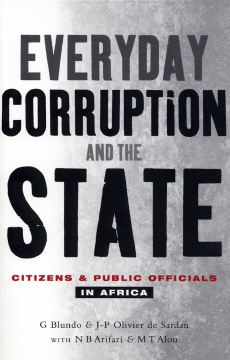
BOOK
Everyday Corruption and the State
Giorgio Blundo | Jean-Pierre Olivier de-Sardan | N. B. Arifari | M. T. Alou
(2008)
Additional Information
Book Details
Abstract
Daily life in Africa is governed by the 'petty' corruption of public officials in services such as health, transport, or the judicial system. This remarkable study of everyday corruption in three African countries investigates the reasons for its extraordinary prevalence.
The authors construct an illuminating analytical framework around the various forms of corruption, the corruptive strategies public officials resort to, and how these forms and strategies have become embedded in daily administrative practices. They investigate the roots of the system in the growing inability of weakened states in Africa to either reward their employees adequately or to deliver expected services. They conclude that corruption in Africa today is qualitatively different from other parts of the world in its pervasiveness, its legitimations, and its huge impact on the nature of the state.
'Everyday Corruption and the State provides an icy critique of the factual shortcomings of a literature over-heated by metaphor, and a demonstration of the systematic, pervasive and institutionalized nature of corruption in three West African states. No-one concerned with developmental issues in Africa can ignore or be indifferent to this evidence of the ways public officials routinely deal with their citizens.'
Richard Fardon, SOAS
'This scholarly, insightful book demonstrates in detail many characteristics of the worst kind of corruption.'
Bryan Rostron, Tribune
'For anyone interested in working in, studying, or analyzing african states, this text will give significant insights into the difficulties in developing stable state infrastructures...A good addition to serious African and development collections.'
R. M. Fulton, Choice
Dr Giorgio Blundo currently holds a senior position at the Ecole des Hautes Etudes en Science Sociales at Marseille.
Jean-Pierre Olivier de Sardan is Professor of Anthropology at the Ecole des Hautes Etudes en Sciences Sociales in Marseilles and Director of Research at the Centre National de la Recherche Scientifique in Paris.
Table of Contents
| Section Title | Page | Action | Price |
|---|---|---|---|
| Cover\r | cover | ||
| Contents | v | ||
| PART I: Approach, Method, Summary | 1 | ||
| 1 Why should we study everyday corruption and how should we go about it?\r | 3 | ||
| Why study corruption? | 4 | ||
| A comprehensive research posture | 8 | ||
| A qualitative methodology | 12 | ||
| Conclusion\r | 13 | ||
| 2 Corruption in Africa and the social sciences: a review of the literature | 15 | ||
| ‘Africanist’ anthropology and corruption | 17 | ||
| Culture and corruption | 25 | ||
| Corruption and colonialism | 37 | ||
| Corruption and the construction of the post-colonial state | 47 | ||
| Gaps, grey areas and new research perspectives\r | 67 | ||
| 3 Everyday corruption in West Africa | 69 | ||
| An identical system of corruption | 69 | ||
| The embeddedness of corruption | 72 | ||
| The embeddedness of corruption in administrative practices | 87 | ||
| Corruption and the transformation of the state | 101 | ||
| Conclusion: what kind of state is involved? | 106 | ||
| 4 The popular semiology of corruption | 110 | ||
| Justificatory utterances | 111 | ||
| The semantic field | 120 | ||
| Corruption and witchcraft | 129 | ||
| Conclusion\r | 133 | ||
| PART II Sectoral Studies\r | 135 | ||
| 5 Corruption in the legal system\r | 137 | ||
| Corruption and the functioning of the legal system | 145 | ||
| Corrupt practices and their reproduction in the legal system | 157 | ||
| Corruption and the institutional weaknesses of legal systems | 167 | ||
| Conclusion: corruption and the transformation of the legal system\r | 172 | ||
| 6 ‘We don’t eat the papers’: corruption in transport, customs and the civil forces | 177 | ||
| From Malanville to Cotonou with a flock of sheep | 177 | ||
| The context of corrupt practices | 183 | ||
| The actors involved in transport-sector corruption | 185 | ||
| The chain of corruption and its mechanisms in the transport sector | 193 | ||
| Roadside checking (gendarmerie and police) | 195 | ||
| The forms of customs corruption | 198 | ||
| Corruption as a response to structural conditions and the availing of opportunities | 210 | ||
| Conclusion\r | 221 | ||
| 7 An ordered corruption? The social world of public procurement | 225 | ||
| The context of the study | 229 | ||
| ‘Legal’ corruption in public procurement | 232 | ||
| Systemic corruption: complicity between decision-makers and contractors | 238 | ||
| ‘The key word is to give’: corruption costs in public procurement | 251 | ||
| From realization to final reception: the combatant’s circuit | 253 | ||
| ‘The contract is like a pregnant woman’: strategies and representations of actors of public procurement | 256 | ||
| Conclusion\r | 260 | ||
| Notes | 263 | ||
| Bibliography | 275 | ||
| Index | 291 |
